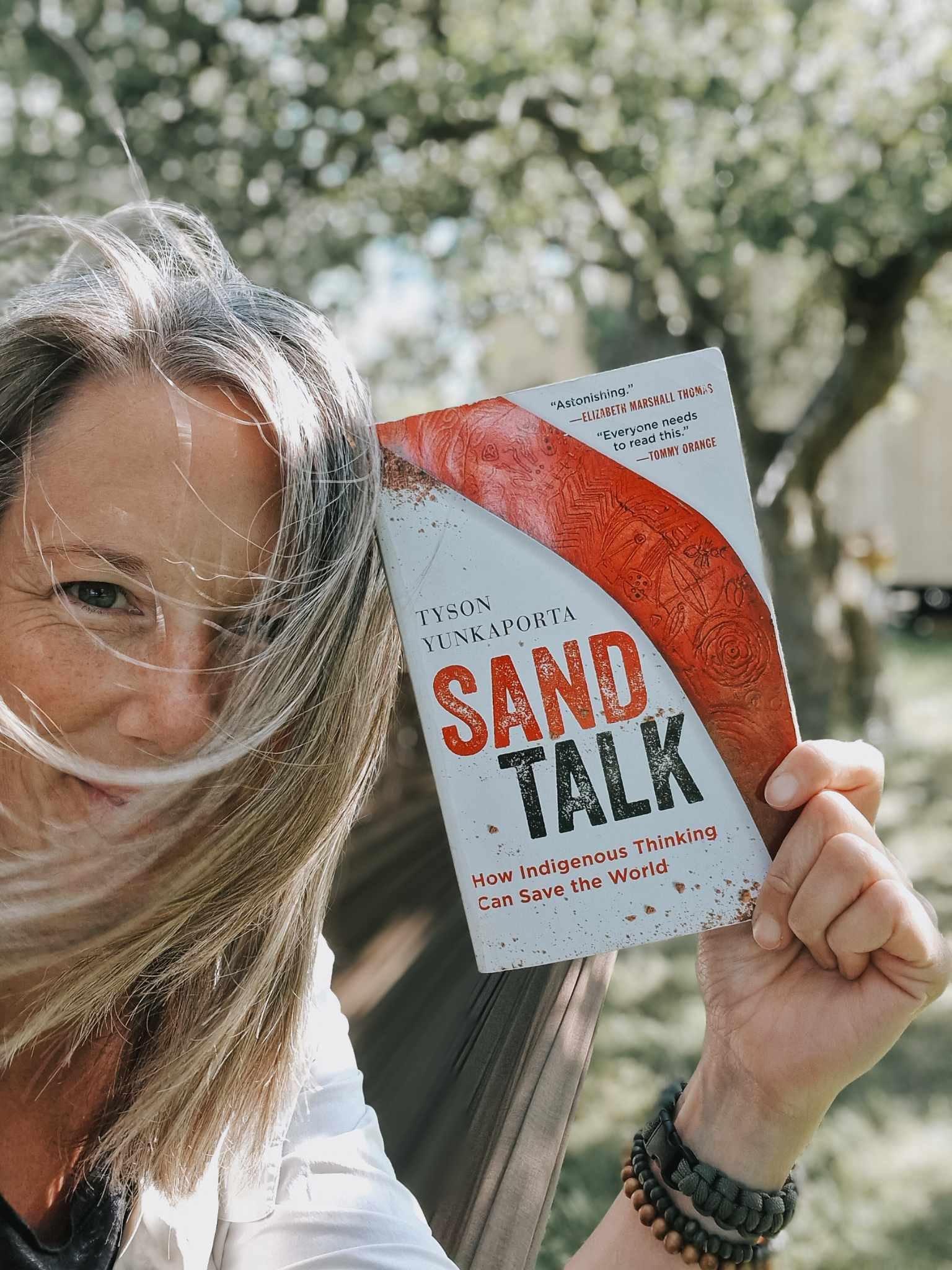Boktips: “Sand Talk”
Jag tycker mycket om att utbyta tankar och erfarenheter med andra, både i tal och i skrift. Något som säkert märks med tanke på det jag skapat genom åren i form av events, föreläsningar, workshops, kurser, podcast, intervjuer och videoprojekt. Så gillar jag ju att läsa också – och i vanlig ordning vill jag dela med mig av det som berör mig.
Under sommaren tänkte jag därför dela några favoritböcker med utdrag, citat och mina anteckningar från läsningen. Böckerna handlar oftast om vad det innebär att vara människa och hur vi lever i relation till vår omgivning. Sååå…. Vill ni följa med på en boktipsrunda?
Se det antingen som en inspiration till att själv läsa böckerna, till att få en snabbresumé om dess djupare innehåll eller mer än gärna – dela dina tankar om boken och det jag delat av den!
Det här är en av de bästa böckerna jag läst!
”Sand Talk - how indigenous thinking can save the world”
Tyson Yunkaporta
Här är några löst utvalda delar, lite av vad jag tar med mig från boken – ibland citerat, ibland direkta utdrag och ibland en sammanfattning av mig. Siffran innan, visar vilken sida i boken som texten är hämtad/sammanfattad ifrån.
4
Complicated, not complex. Viewing the world through a lens of simplicity always seems to make things more complicated but simultaneously less complex.
32
Max said: Stones to me are the objects that parallel all life, more so than trees or mortal things because stones are almost immortal. They know things learned over deep time. Stone represents earth, tools and spirit.
It’s still there, filled with energy and spirit”
34
Stone teaches us that we should be strong no matter what tries to crack us or wear us down, keep an unbreakable core.
The majority of our earth is rock – water and plants are only on the surface. You can have life and creation, but not without a solid base.
36
Who is indigenous?
For the purposes of the thought experiments on sustainability in this book, an indigenous person is a member of a community retaining memories of life lived sustainably on a land base, as part of that land base.
Indigenous knowledge is any application of those memories as living knowledge to improve present and future circumstances.
38
I breath the breaths of the ancestors, and everybody else’s too. Always was, always is and always will be.
39
Nothing is created or destroyed; it just moves and changes. This is the first law.
Creation is a constant state of motion, we must move with it or we will damage the system and doom ourselves.
Nothing can be held, stored. Every unit requires velocity and exchange in a stable system – or it will stagnate. Economic and social systems, and natural ones, they all follow the same laws.
51
För at ten ekonomi ska funka behöver det finnas behov/efterfrågan. Alltså måste många leva i brist för att något ska ha ett värde och ekonomin växa.
69
Move with the land. Maintain diverse languages, cultures and systems that reflect the ecosystems of the shifting landscapes you inhabit over time. That is the blueprint.
76
I tell those children… that these economies fall apart fairly regularly… nobody wants to hear this. I need to show them how to read patterns and see the past, present and future as one time and let them navigate themselves.
77
Look beyond the things and focus on the connections between them. Then look beyond the connections and see the pattern they make. Find the sites of potential and increase.
85
Sustainable systems cannot function without the full autonomy and unique expression of each independent part of the independent whole. Diversity – Connect – Interact – Adapt = Guidelines för hållbarhetsagenter
122
Skolsystemet – liknande domesticerade djur:
1, Separate the young from their parents during the daylight hours.
2, Confine them in a enclosed space with limited stimulation or access to natural habitat.
3, Use rewards and punishments to force them to comply with purposeless tasks.
139
Våra långa arbetsdagar är längre än de behöver vara, mer för social kontroll än produktivitet. Det är svårt att skapa sig space för att ifrågasätta systemet när man jobbar 8h per dag och stressar på för att få livet att gå runt med hälsa, mat, motion, familj…
140
Det är inte jobb vi vill ha… Det är skyddad sovplats, mat, relationer, ett livable habitat, lära oss om det som intresserar oss och att utföra sånna uppgifter som vi anser vara betydelsefulla. Fiska, jaga, plocka svamp och odla är fritidsintressen idag, men något vi skulle kunna ägna oss åt.
144
Vi behöver inte höra hur andra gör, vi behöver inte någon som säger till oss hur det ska vara. The assistance I’m talking about comes from sharing patterns of knowledge and ways of thinking that will help trigger the ancestral knowledge hidden inside”
153
Fokusera inte på idéer och objekt i isolation. Även ord i print, där en dialog inte sker, är ren form av isolation. Relationer!
172
Understanding biological networks means finding a way to belong personally to that system.
209
Aboriginal worldview – no word for safety or risk, but plenty of words for protection.
242
Indigenous knowledge is not about the what, but the how. It is about process, not content. Your culture is not what your hands touch or make – it is what moves your hand. (Alltså vår inre glöd)
248
“Face the truth, make amends, and let it go”
“So let’s put these hands of ours to work”
----------------
Det var några av mina anteckningar efter att ha läst boken.
Hoppas de gav dig någon tanke att ta vidare, en nyfikenhet att utforska mer!
Vad väcks hos dig?

